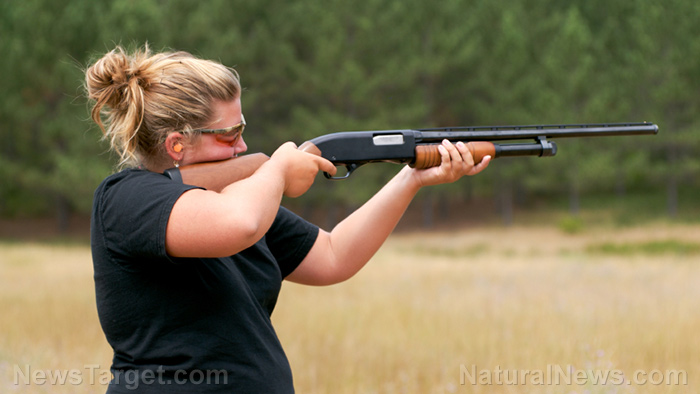
When it comes to home defense, shotguns are one of the most popular weapons. However, they're also one of the most misunderstood.
Whether you're a prepper, a gun enthusiast, or someone who's simply interested in using a shotgun for home defense, below are some debunked myths and confirmed realities about this versatile weapon. (h/t to OffTheGridNews.com.)
Shotgun myths
A 20 gauge isn't powerful enough.
If you're talking about shotguns, people will usually think of 12 gauges. Most of them will dismiss the common 20 gauge shotgun as too underpowered, which is the farthest thing from the truth.
A 12 gauge is more powerful than a 20 gauge shotgun, but the latter is still powerful enough when used a home defense weapon. A 20 gauge has stopping power roughly equivalent to two .44 Magnums fired at the same time. (Related: SHTF: If you are well prepared, you will become an instant target of the non-prepared.)
Simply hearing the pump action is enough to scare potential attackers.
The sound of a pump-action shotgun is unmistakable, and there are those who believe that hearing it is enough to scare away any burglars trying to break into your home. However, this doesn't mean that hearing the pump action is enough to automatically stop looters. In fact, they might just ignore the sound if they're also armed.
You can't miss with a shotgun.
Think of the last time you saw the main character in a movie use a shotgun. Odds are, no matter what was happening onscreen, they never missed their target.
In real life, like with any other weapon, you need to aim when you fire a shotgun. You must aim carefully, especially during close quarters combat. If you're targeting something close to you, the shot pattern will be smaller so you must aim with care.
You only need one shot to defeat your attacker.
This isn't impossible, but you need to have incredible shootings skills to pull this off every time. A normal person may slow down once you hit them in the gut, but someone who's high on drugs may be too amped up to feel the damage from a single round of buckshot.
To avoid this, use a semi-auto or pump-action shotgun instead of a single or double barrel so you can fire several rounds in quick succession.
Shotgun realities
Shotguns are suitable home defense weapons.
For the average American, a 12 gauge shotgun full of buckshot rounds is a good enough weapon for home defense. As long as you're aware of the myths about shotguns, you'd do well with a 12 gauge shotgun even in a close-quarters defensive situation.
The 20 gauge shotgun is a better weapon for someone of small stature.
Regardless of your height, you can use a 12 gauge as long as you can shoot it comfortably. However, if you're having trouble with the recoil, you can switch to a weapon of a different caliber.
Women and those who are shorter than average tend to favor the 20 gauge shotgun. Even if the 20 gauge isn’t as powerful as the 12 gauge, it still packs enough knockdown power but with less recoil. One thing to take note of is the weight difference: 20 gauge shotgun with half the weight of a 12 gauge could have more recoil when fired.
Buckshot is more effective than birdshot.
Contrary to popular belief, birdshot will penetrate walls. Despite this fact, buckshot is better than birdshot for home defense since a handful of the former can hurt more than hundreds of smaller pellets from the latter.
Birdshot refers to the smallest type of shotgun pellets. They are often used by hunters who want to shoot birds or other flying wildlife. A birdshot shell contains small steel or lead spheres that scatter outward once they're fired from the shotgun.
On the other hand, buckshot refers to shotgun ammunition that uses large metal pellets in shotgun shells. While buckshot scatters outward like birdshot, the former does more damage because it has larger pellets.
Keep these things in mind if you're planning on getting a shotgun for home defense, and learn how to use your weapon of choice so you can protect your loved ones.
To read more articles about the benefits of using a shotgun for home defense or survival, visit Guns.news.
Sources include:
Please contact us for more information.





















